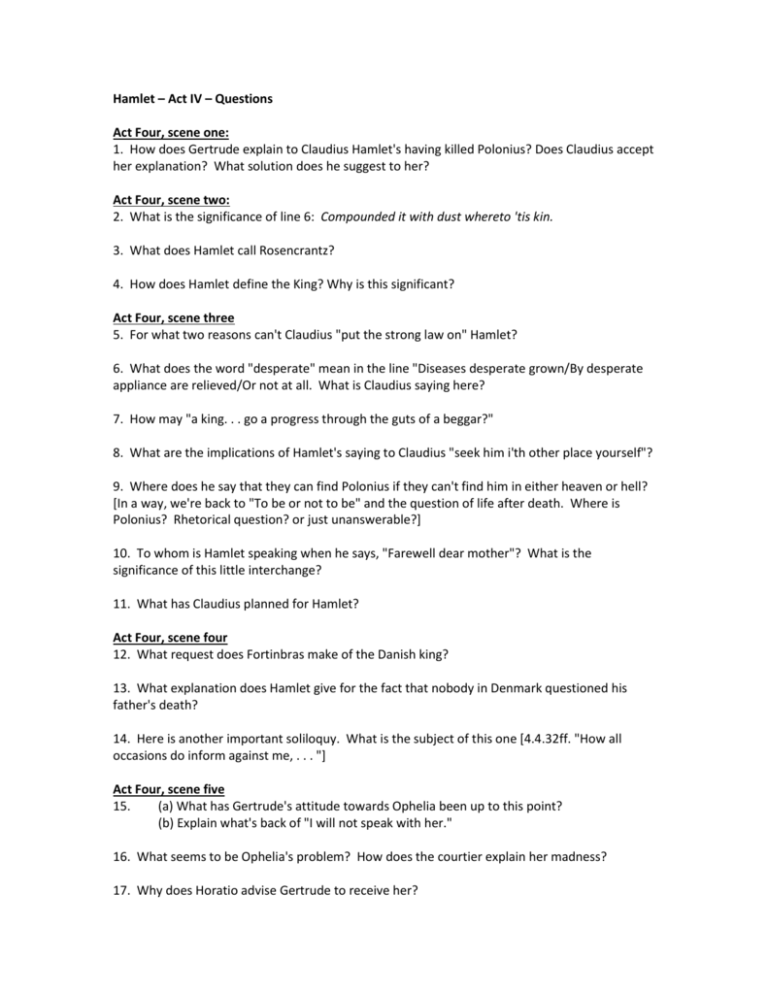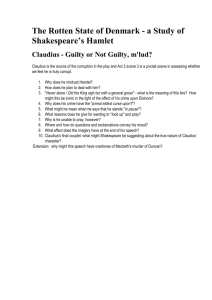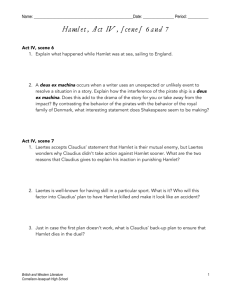Hamlet – Act IV – Questions
advertisement

Hamlet – Act IV – Questions Act Four, scene one: 1. How does Gertrude explain to Claudius Hamlet's having killed Polonius? Does Claudius accept her explanation? What solution does he suggest to her? Act Four, scene two: 2. What is the significance of line 6: Compounded it with dust whereto 'tis kin. 3. What does Hamlet call Rosencrantz? 4. How does Hamlet define the King? Why is this significant? Act Four, scene three 5. For what two reasons can't Claudius "put the strong law on" Hamlet? 6. What does the word "desperate" mean in the line "Diseases desperate grown/By desperate appliance are relieved/Or not at all. What is Claudius saying here? 7. How may "a king. . . go a progress through the guts of a beggar?" 8. What are the implications of Hamlet's saying to Claudius "seek him i'th other place yourself"? 9. Where does he say that they can find Polonius if they can't find him in either heaven or hell? [In a way, we're back to "To be or not to be" and the question of life after death. Where is Polonius? Rhetorical question? or just unanswerable?] 10. To whom is Hamlet speaking when he says, "Farewell dear mother"? What is the significance of this little interchange? 11. What has Claudius planned for Hamlet? Act Four, scene four 12. What request does Fortinbras make of the Danish king? 13. What explanation does Hamlet give for the fact that nobody in Denmark questioned his father's death? 14. Here is another important soliloquy. What is the subject of this one [4.4.32ff. "How all occasions do inform against me, . . . "] Act Four, scene five 15. (a) What has Gertrude's attitude towards Ophelia been up to this point? (b) Explain what's back of "I will not speak with her." 16. What seems to be Ophelia's problem? How does the courtier explain her madness? 17. Why does Horatio advise Gertrude to receive her? 18. Again, we have an allusion to questions to "To be or not to be." See I John 3:1 and think about it in relation to Ophelia's "Lord, we know what we are, but know not what we may be. God be at your table!" [4.5.48-49] 19. Some critics believe this scene proves Ophelia and Hamlet have been lovers. Some even suggest that Ophelia is pregnant and that she drowns herself because of this. What do you think? 20. How does Claudius explain Ophelia's madness? Why is Claudius particularly affected by her condition? 21. Why does Claudius have Swiss guards rather than Danish? 22. Whom are the common people proclaiming King of Denmark? 23. Does Laertes allow the crowds to come in with him to confront the King? 24. Who quickly assures Laertes that Claudius has not killed Polonius? Why is this signficant? 25. Is Laertes afraid of damnation? Why is this significant? 26. How does Claudius quiet Laertes? Think about the line "Like a good child and a true gentleman." 27. What happens to re-incite Laertes's passion for revenge? Compare to 1.4.39-45. 28. Besides his father's murder, what does Laertes question? Act Four, scene six 29. What news does Horatio receive about Hamlet? 30. Do you detect a Biblical echo here that is excellent shorthand for the full meaning of the line: "They have dealt with me like thieves of mercy, but they knew what they did: I am to do a [good] turn for them"? [4.6. 20-22] Act Four, scene seven 31. How does Claudius explain his failure to punish Hamlet to Laertes? 32. With what news does the messenger interrupt Claudius? 33. What is the significance of Claudius's sending the messenger away and sharing the contents of Hamlet's letter with Laertes? 34. What is the significance of the line: To show yourself in deed your father's son More than in words. And of the immediate: To cut his throat i' the church. 35. Why is it significant that it is Claudius who describes Hamlet as "most generous, and free from all conniving? 36. What is Claudius' plan? What is his backup plan? 37. The Queen brings news of what tragic event? 38. What was Ophelia doing when she fell into the water? She is "drowned" literally and figuratively. How figuratively? What is the cause of her death? 39. Her death echoes whose in the Arthurian legend? This is a picturesque (romantic) death. What is the significance of the line: "But long it could not be/Till that her garments, heavy with their drink,/Pulled the poor wretch from her melodious lay/To muddy death"?





